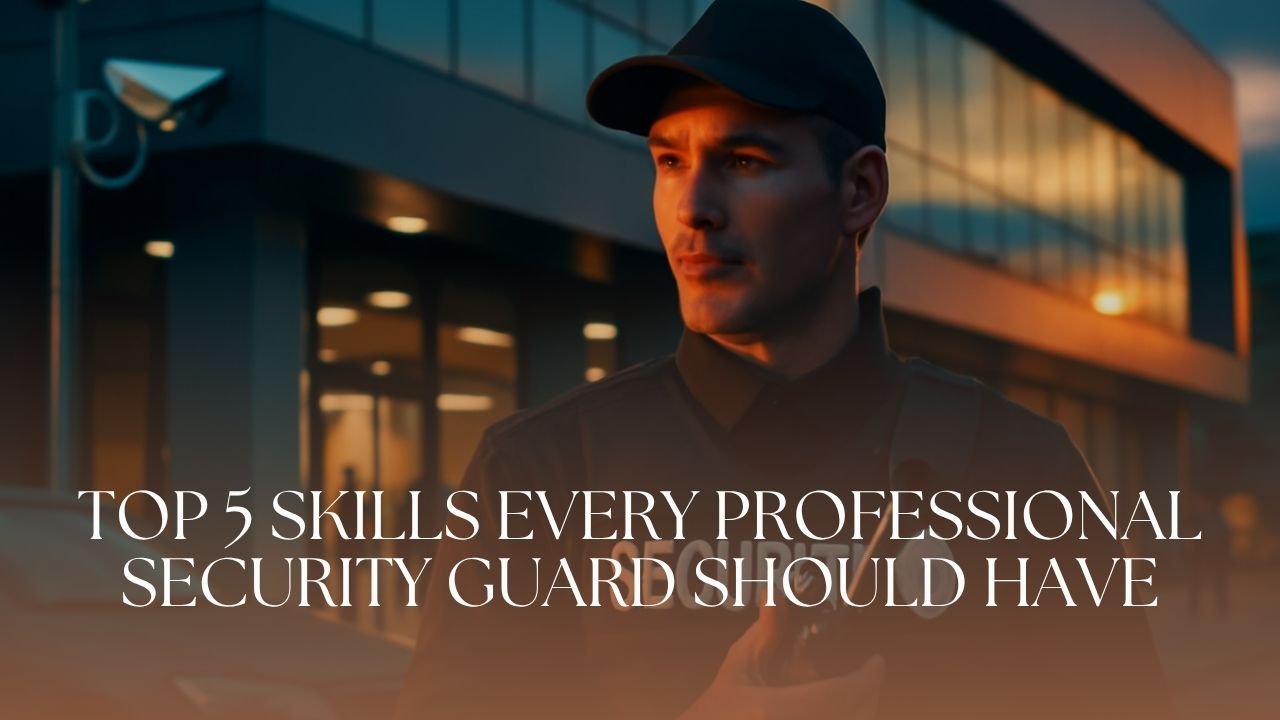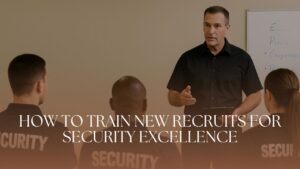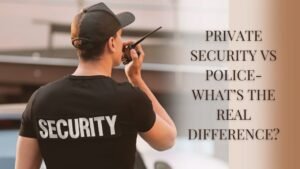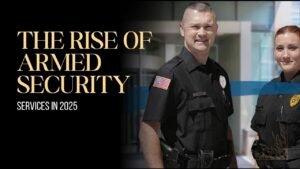In today’s unpredictable world, security professionals are more than just watchful eyes at entrances. They are the first line of defense in protecting lives, assets, and sensitive information.
Whether guarding a residential complex, hospital, corporate office, or public event, a professional security guard must blend vigilance, communication, and emotional intelligence to prevent crises before they occur.
However, many aspiring guards underestimate the complexity and skill demands of this career. The role is not just about physical presence — it’s about mental sharpness, judgment, and discipline.
In a world where threats range from thefts and trespassing to digital and physical hybrid attacks, modern security requires smart, well-trained professionals.
This article breaks down the top five essential skills every professional security guard must have — with detailed examples, training methods, and insights to help you stand out in 2025’s competitive security industry.
Why Skills Define a Modern Security Guard
The security industry has evolved dramatically. Gone are the days when a uniform and baton were enough.
Today, guards are expected to use smart surveillance systems, emergency protocols, and even AI-assisted monitoring tools. They must know how to talk to people, analyze situations, and de-escalate conflict professionally.
Key Reasons Skills Matter
- High-risk environments: Guards now protect malls, airports, banks, schools, and high-security facilities.
- Public interaction: You must manage crowds, deal with clients, and communicate calmly under stress.
- Legal accountability: Reports and evidence you record can influence investigations or court cases.
- Technology integration: Modern guards work with alarms, CCTV networks, and biometric systems.
- Crisis prevention: Most incidents are avoided through keen observation and quick decision-making.
In short, security guards are not just observers — they are trained professionals entrusted with public safety.
Overview of the Top 5 Essential Skills
| Rank | Skill | Why It’s Important | Core Abilities | How to Improve |
|---|---|---|---|---|
| 1 | Communication & Interpersonal Skills | Helps in giving clear instructions, calming conflicts, and writing accurate reports. | Speaking, listening, reporting | Take communication workshops, practice report writing |
| 2 | Observation & Situational Awareness | Enables early detection of threats, suspicious behavior, or security breaches. | Attention to detail, vigilance | Play observation games, rotate patrol patterns |
| 3 | Critical Thinking & Decision-Making | Helps you assess situations quickly and choose the safest, smartest action. | Risk analysis, prioritization | Study real-world case studies, do scenario drills |
| 4 | Conflict Resolution & De-escalation | Prevents violence, protects property, and maintains professional conduct. | Negotiation, empathy | Take role-playing exercises, learn de-escalation techniques |
| 5 | Adaptability & Technological Literacy | Keeps you efficient with changing tools, duties, and environments. | Tech awareness, flexibility | Learn to operate new systems, stay updated on security trends |
1. Communication and Interpersonal Skills
Why Communication Is the Cornerstone of Security Work
A security guard’s communication skills can decide whether an incident ends peacefully or escalates.
You are the bridge between management, the public, and law enforcement. Good communication ensures clarity, trust, and control.
Key Aspects of Strong Communication
- Verbal Skills: Speak clearly, confidently, and respectfully. Avoid jargon that confuses people in stressful moments.
- Non-Verbal Cues: Maintain an approachable posture and calm tone. Body language often speaks louder than words.
- Active Listening: Listen carefully to complaints, suspicious details, or witness statements.
- Written Communication: Your incident reports should be detailed, objective, and legally sound.
Example Scenario
A guard at a shopping mall spots a heated argument between two customers. Instead of shouting, the guard uses a calm voice:
“Let’s step aside for a moment and talk it out. I’m here to help, not accuse anyone.”
This tone immediately diffuses tension. That’s the power of communication.
How to Build Communication Skills
- Record yourself giving instructions — review tone and clarity.
- Read aloud daily to improve articulation.
- Practice calm speech during simulated emergencies.
- Learn to summarize events precisely in reports.
2. Observation and Situational Awareness
The Art of Staying Alert
Observation is the core skill that defines an excellent security guard. It’s not just about watching screens or patrols — it’s about noticing what’s out of place.
Whether it’s a flickering light, a misplaced bag, or a nervous visitor, your awareness can prevent a crisis.
Key Components of Situational Awareness
- Baseline Knowledge: Know what’s normal in your environment — usual faces, routes, and routines.
- Pattern Recognition: Detect small deviations — unusual behavior, timing, or movement.
- Environmental Scanning: Continuously monitor your 360° surroundings without tunnel vision.
- Documentation: Note down unusual occurrences before they fade from memory.
Example Scenario
During a routine CCTV scan, a guard notices a person repeatedly circling the same floor without shopping.
By staying alert and reporting early, the guard prevents a potential theft before it occurs.
How to Improve Observation
- Practice “spot the difference” drills or surveillance reviews.
- Change patrol routes frequently to avoid routine fatigue.
- Train your memory by recalling visual details from each round.
- Keep daily observation logs and discuss patterns during team briefings.
3. Critical Thinking and Decision-Making
Thinking Under Pressure
Security work often involves split-second decisions that could save lives or avoid danger.
A professional guard must quickly assess threats, evaluate options, and act within company policy and law.
Core Elements of Critical Thinking
- Risk Assessment: Identify the severity and probability of potential threats.
- Prioritization: Decide which problem to address first during multi-incident scenarios.
- Problem-Solving: Choose the best solution using facts, not emotions.
- Judgment: Balance safety, legality, and practicality before taking action.
Real-World Example
A security officer sees smoke near an office room. Instead of panicking, they first confirm the source, alert control, activate alarms, and guide evacuation — all within seconds. That’s critical thinking at work.
Training to Improve Decision Skills
- Participate in mock emergency drills with varied outcomes.
- Study case files of past incidents to learn how decisions impacted results.
- Use “What If” exercises to prepare for different situations.
- Learn your organization’s escalation procedures by heart.
Mindset Tip
Stay calm — pressure clouds logic. Slow breathing and focused thinking help you make smarter calls.
4. Conflict Resolution and De-Escalation
Why Conflict Management Is Crucial
Security guards deal with people — and people can be unpredictable. Whether it’s an angry customer, trespasser, or employee dispute, your goal is to prevent violence and restore order without unnecessary force.
Principles of Conflict Resolution
- Stay Neutral: Don’t take sides or argue emotionally.
- Acknowledge Feelings: People calm down when they feel heard.
- Offer Choices: Give alternatives (“You can wait here or step outside”).
- Set Boundaries: State consequences firmly but respectfully.
- Know When to Escalate: Call supervisors or police if safety is at risk.
Example Scenario
A drunk individual refuses to leave a private event. Instead of shouting or grabbing, the guard says:
“Sir, I understand you want to enjoy the evening, but let’s step outside to talk privately.”
That simple act of empathy and distance can prevent escalation.
Building De-Escalation Skills
- Enroll in verbal judo or crisis negotiation workshops.
- Watch real-world bodycam interactions and analyze tone control.
- Practice empathy — listen first, respond second.
- Reflect after each incident: what worked, what didn’t, and how you felt.
5. Adaptability and Technological Literacy
The Modern Guard’s Advantage
The world of security is changing rapidly. From AI-driven surveillance to digital access control, guards must now work alongside technology.
Adaptability ensures you stay efficient, while technological literacy makes you an asset to any company.
Key Aspects
- Learning New Tools: From security software to RFID scanners, stay up-to-date.
- Flexibility: Be ready to adjust to shift changes, weather, or new duties.
- Stress Tolerance: Emergencies demand calm and mental resilience.
- Continuous Learning: Attend briefings, read manuals, and ask for hands-on training.
Example
When an alarm monitoring system fails, a tech-savvy guard can manually verify security points and log events without delay. That adaptability maintains safety and trust.
Ways to Stay Updated
- Join internal refresher programs and tech demos.
- Watch security webinars or tutorials.
- Volunteer for new-system testing to learn features early.
- Maintain digital literacy — understand basic troubleshooting, password safety, and data privacy.
Beyond the Five — Supporting Skills That Boost Success
While these five form the foundation, exceptional guards also benefit from:
- Physical Fitness: Helps with endurance during patrols and emergencies.
- Ethical Conduct: Integrity ensures honesty in every report or testimony.
- Teamwork: Most guards operate as part of a larger unit; coordination saves lives.
- Customer Service Mindset: You are the face of the facility; courtesy creates confidence.
Professional security today is a blend of soft skills, mental discipline, and technical understanding. Continuous learning transforms an ordinary guard into a trusted protector.
Developing and Demonstrating These Skills
1. Formal Training
Enroll in professional security courses that teach observation, communication, and emergency response. Certification not only improves skills but also boosts employability.
2. Mentorship
Seek guidance from experienced supervisors. Shadow them during shifts to observe decision-making and reporting standards.
3. Regular Drills
Routine fire, evacuation, and intrusion drills sharpen reflexes. Practice helps you apply theory in real-time conditions.
4. Personal Reflection
After each incident or shift, write a short review:
- What went well?
- What signs did I miss?
- How can I communicate better next time?
Over time, these reflections compound into mastery.
Quick Comparison of Essential Security Guard Skills
| Skill Area | Core Traits | Everyday Example | Result |
|---|---|---|---|
| Communication | Verbal clarity, empathy, composure | Giving calm instructions during crowd control | Reduces panic and builds trust |
| Observation | Awareness, attention to detail | Spotting a suspicious bag during patrol | Prevents theft or threat escalation |
| Critical Thinking | Judgment, logic, prioritization | Deciding to call backup instead of direct confrontation | Ensures safety and compliance |
| Conflict Resolution | Patience, negotiation, professionalism | Calming a customer arguing with staff | Avoids property damage and police intervention |
| Adaptability | Flexibility, tech knowledge | Learning new CCTV system quickly | Boosts efficiency and confidence |
The Future of Security: Skill-Driven Professionals
The next generation of security guards will operate in a tech-integrated ecosystem — drones, access analytics, bodycams, and real-time alert systems. But even with these tools, human skills will remain irreplaceable.
In the coming years, security professionals who combine human intuition with technical understanding will lead the field.
Employers value guards who can communicate confidently, think critically, and adapt fast under pressure.
Being a professional security guard is not about standing post — it’s about mastering the skills that protect people and property in a dynamic, uncertain world.
The five pillars — communication, observation, critical thinking, conflict resolution, and adaptability — form the backbone of a successful security career.
When you develop these abilities, you not only ensure safety but also earn respect, trust, and long-term career growth. Whether you’re patrolling a building, managing an event, or monitoring cameras, remember: your skillset is your strongest weapon.
Security isn’t just a job — it’s a commitment to vigilance, professionalism, and continuous improvement. Train regularly, stay aware, and let your expertise speak louder than your uniform.
FAQs
What makes communication so critical in security work?
Communication ensures smooth coordination, calm under stress, and accurate reporting. A guard with strong communication skills can defuse conflicts, manage emergencies, and maintain a professional image.
How can I improve my observation skills on duty?
Stay alert to your surroundings, note unusual patterns, rotate patrol routes, and practice short memory exercises. Daily awareness training sharpens your instincts over time.
Do I need technical skills to become a professional guard?
Yes. Modern guards often use electronic access systems, alarm networks, and surveillance tools. Being comfortable with basic technology increases efficiency and job security.




